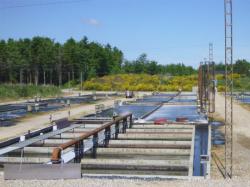ASC Certified Trout Coming Soon To The Market
July 17, 2014 | 3 min to read

Danforel’s Christiansminde Freshwater Farm in Denmark has become the first farm certified to the ASC Freshwater Trout Standard for responsible aquaculture.
“The certification of the first freshwater trout farm this week brings ASC a step closer to becoming a truly global programme. I am thrilled to get the trout programme off the ground, and I would like to extend my congratulations to Danforel for their tremendous achievement,” said Chris Ninnes, CEO of the ASC.
“This certification is a testament to the diversity of our programme and, since the launch in 2012, we have seen the number of ASC certified farms grow to nearly 80 across the globe throughout Asia, Scandinavia, Australia, Europe, and South, Central and North America. There are also over 50 farms under assessment”
“Danforel prides itself in only supplying the best quality seafood that has been responsibly farmed to minimise potential environmental and social impacts. ASC certification fits perfectly with our strategy. It allows our farms to demonstrate that they comply with the most rigorous farming standards and shows our customers that we are a responsible organisation,” said Erik D. Hansen, Managing Director Danforel A/S.
Transparent independent third party process
Danforel’s Christianminde farm gained its certification following an independent, third party assessment against the global ASC Trout Standard conducted by the certification body Bureau Veritas Denmark.
ASC strives to have a fully transparent certification process. The announcement of a farm audit needs to be publicly visible for at least 30 days before the actual audit. Once the farm has been assessed by an accredited auditor, the next step is for the certifier to develop the draft farm audit report.
Robust and credible global trout standard
The ASC Freshwater Trout Standard was developed by a diverse group of stakeholders, including farmers, conservationists, scientists, seafood buyers, processors, government officials and other interested parties.
Farms certified against the ASC Freshwater Trout Standard must demonstrate that they use farming methods that minimise the environmental impacts. They deliver a cleaner seabed, cleaner water and healthier fish, preserve the diversity of the species and wild population, and follow strict feed requirements and ensuring social responsibility.
ASC certified trout, bivalves and shrimp coming soon
A further six trout farms are currently awaiting the outcome of their assessment against the ASC standard.
Other ASC standards species that are due to hit the market this year are bivalves and shrimp. Five scallop farms were audited in Peru in May this year. And, 14 shrimp farms in Vietnam and Ecuador have already entered the ASC certification programme.
ASC certified trout, scallop and shrimp products are expected to enter the market later in 2014.
About ASC
The Aquaculture Stewardship Council (ASC) is as an independent, not-for-profit organisation founded by World Wildlife Fund (WWF) and The Sustainable Trade Initiative (IDH) in 2010 to manage the certification of responsible fish farming across the globe.
The ASC standards require farm performance to be measured against both environmental and social requirements. Certification is through an independent third party process and (draft) reports are uploaded to the public ASC website.
The on-pack ASC logo guarantees to consumers that the fish they purchase has been farmed with minimal impacts on the environment and on society.
The ASC standard addresses the following seven principles:
– Legal compliance (obeying the law, the legal right to be there)
– Preservation of the natural environment and biodiversity
– Preservation of the water resources and water quality
– Preservation of the diversity of species and wild populations (for example, minimising escapes that could become a threat to wild fish)
– Monitored and responsible use of animal feed and other resources
– Animal health (no unnecessary use of antibiotics and chemicals)
– Social responsibility (for example, no child labour, health and safety of employees, freedom of assembly, community relations).
For more information about ASC please visit www.asc-aqua.org
Source: The Aquaculture Stewardship Council (ASC)
